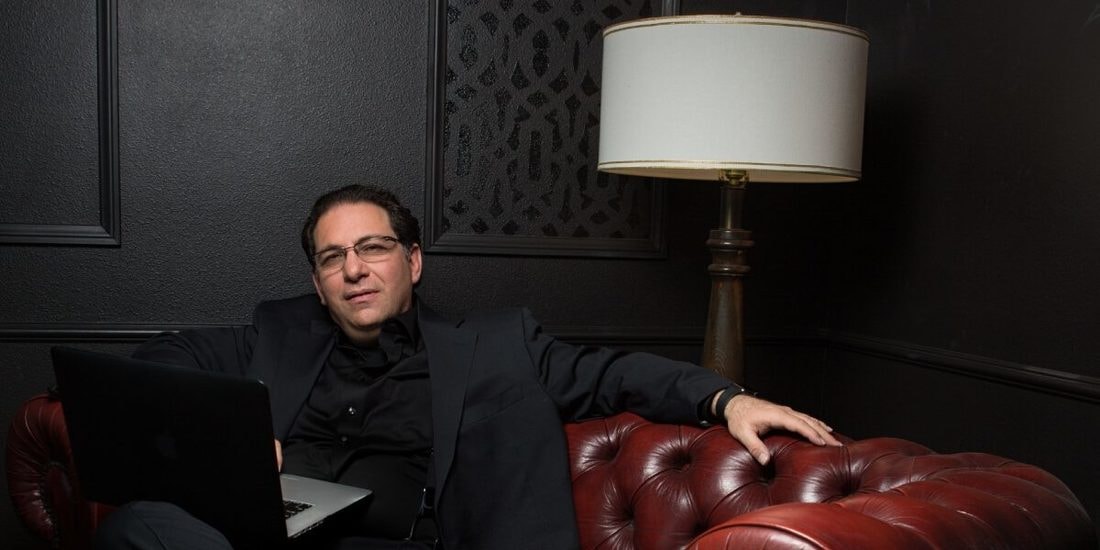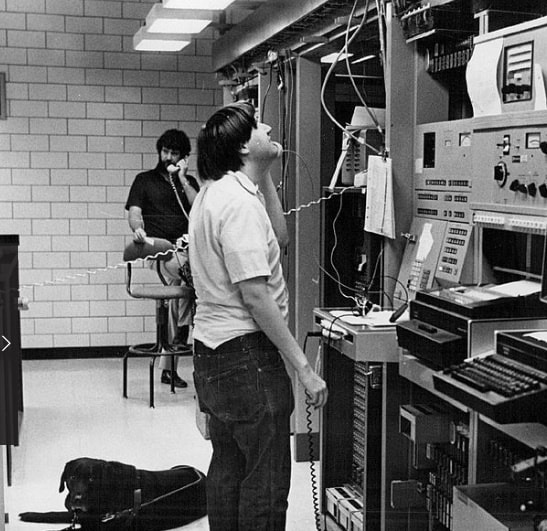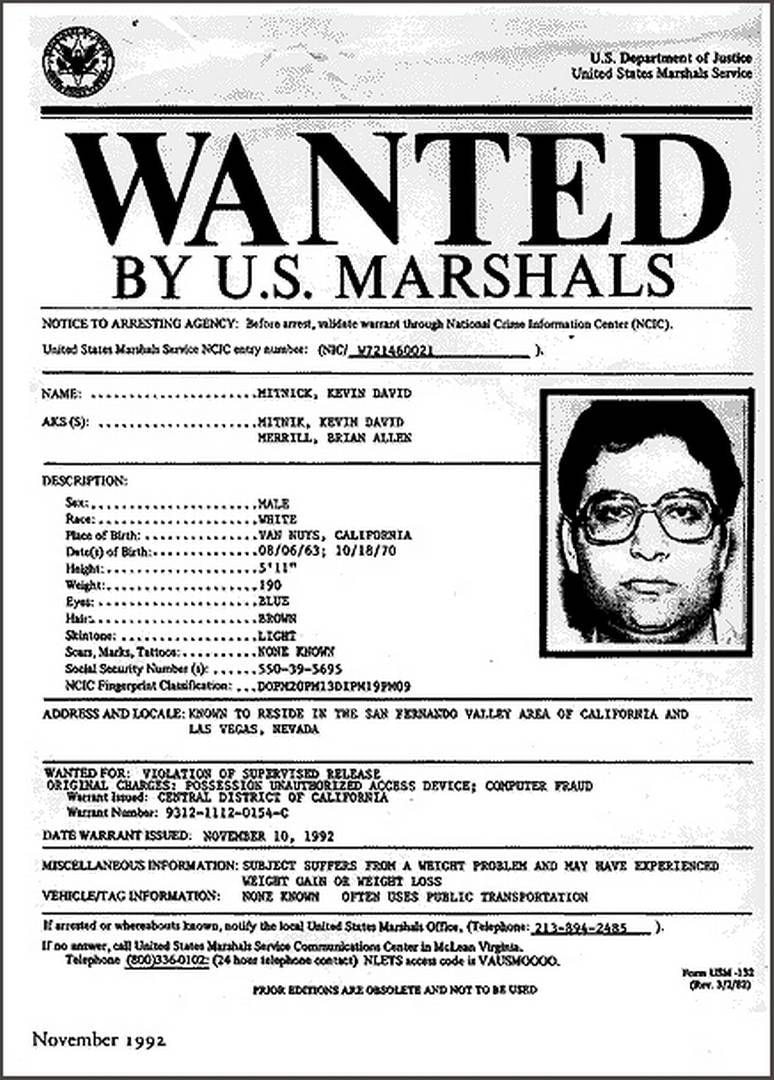Man
Professional
- Messages
- 3,221
- Reaction score
- 1,190
- Points
- 113
History of the legend.
Salute to all, dear friends!
Kevin Mitnick is the man who made the words "hacker" and "social engineering" widely known. Kevin Mitnick started when computers were not in common use and many phones had rotary dials. Today he works as a computer security consultant, but 30 years ago he was the first hacker in the United States and the FBI's most coveted prey. In today's article, we will tell you how Kevin did it.
Mitnick became interested in hacking at the age of 16. Back then, in 1979, it was not even considered a criminal activity, there were no corresponding laws, and it was not a mass phenomenon. On the contrary, such enthusiasm for learning computers was encouraged by school teachers and parents. There were no ethical doubts.
"If you could hack into a school computer, you were a wizard. If you did that today, you'd be expelled or the cops would be called. It was later criminalized, " Kevin himself recalled in an interview 10 years ago.

For the hacker himself, it was more like a game than a violation of the law. He called it an adventure, exciting and adventurous. With the help of his own intellect, Mitnick overcame obstacles in this big game.
It all started with bus trips...
The guy asked the friendly driver where he could buy a similar hole punch. He said he needed it for a school project. And the man gave away the secret without a second thought. Fifteen dollars from his mother and a dive into dumpsters completed Mitnick's first hacker trick. He bought a hole punch with the money and collected unused tickets from dumpsters.
Soon the boy remembered most of the useful routes for himself and rode them for free. Fortunately, he had everything he needed to cheat the system. Kevin himself in his biography believed that this fact is one of the amazing examples of his memory. To this day, he remembers phone numbers, passwords and other useful combinations that he memorized as a child.
"He could do amazing things with phone systems. He could find unlisted numbers and run a person's name. He introduced me to phone hacking. And when phone companies started moving to electronic systems, they started using the advanced computers of the time to control them.
Kevin's friend also knew a secret test number for making long-distance calls absolutely free. For the two of them, of course. And it wasn't a test number. The phone company, Mitnick later learned, was billing some small, poor firm for these calls.
Kevin's phreak friends were essentially his hacker kindergarten. He listened to them call phone companies, using little tricks and jargon to sound credible and impressive. Soon Mitnick was phreaking himself. One of his favorite pranks was changing the service class of his friends' phones. When they tried to call anywhere from their landlines, they were greeted by a pay phone asking for a 10-cent fee.

Using only his voice and touch-tone dialing, Kevin could find out a phone number by name and city. He pulled this trick on the teacher of the computer course for school graduates so that, despite not being a graduate, he could get into his classes. The teacher was impressed by such skills of the teenager, but later he most likely regretted that he helped Mitnick master computer knowledge.
When Kevin was 17, the phone company literally pulled the phone cord out of his apartment, furious that he had hacked their system using social engineering. Because there was no other legal way to stop a hacker.
The resourceful boy didn't lose his head. He lived with his mother in apartment number 13, so he simply went to a hardware store and bought two numbers and a letter, which made up the number 12B. That's how he managed to sign a new service contract with the phone company.
— By the age of 17, I had developed my social engineering skills to the point where I could talk most Telco employees into doing anything, whether I spoke to them in person or on the phone.
Posing as one of the project's lead developers, Kevin called the system administrator and said he couldn't log into one of his accounts. The guy managed to talk some sense into the employee and get all the information he needed in less than five minutes.

In the photo above you can see the Blue Box. The device phreaks used to manipulate telephone networks. Before Apple was created, Wozniak and Jobs made money on such things.
But Mitnick only had to face justice for this case in 1988, when a former friend snitched on him. The guy was arrested and sentenced to a year of probation with three years of supervision.
True, Kevin had already been convicted long before that. In 1981, he and his friends broke into the Pacific Bell office, where they stole a list of security keys. If it hadn't been for the girlfriend of one of Mitnick's partners, who turned them in to the police, he might have avoided his first term and three months in prison.
After serving another six months in prison for illegally accessing the ARPAnet (the precursor to the Internet), Mitnick seemed to have sobered up, gotten a girlfriend, and settled down. But because of a latent desire to find out how far his tongue could take him, what secrets it would allow him to uncover, the guy continued to play with fire and ended up on a federal wanted list. However, Kevin's reputation allowed law enforcement to pin all the blame on him.

In 1987, the hacker was arrested for breaking into the computer of software publisher Santa Cruz Operation and sentenced to three years probation, and a year later, the teenage story with DEC surfaced. True, the lawyer then managed to convince the court that Mitnick had a problem with drug addiction to computers. A year in prison, six months in treatment under the Alcoholics Anonymous program...
In 1992, Kevin disappeared from the radar, just before an FBI raid on him for violating his supervised release. Investigators had reason to believe that new phone phreaking cases had surfaced that matched Mitnick's signature. From somewhere in Southern California, a hacker had been able to access the state's phone system and eavesdrop on FBI agents.

Kevin's fame was largely due to the journalist of The New York Times, John Markoff, who vividly described the guy's adventures and described him as almost the main hacker of our time and one of the most painful pains in the FBI's ass.
For example, as Markoff wrote, in Los Angeles, Mitnick managed to reprogram the telephone network so that agents, tracking his call, would break into not the hacker's lair, but the home of an immigrant from the Middle East who was peacefully watching television.
Salute to all, dear friends!
Kevin Mitnick is the man who made the words "hacker" and "social engineering" widely known. Kevin Mitnick started when computers were not in common use and many phones had rotary dials. Today he works as a computer security consultant, but 30 years ago he was the first hacker in the United States and the FBI's most coveted prey. In today's article, we will tell you how Kevin did it.
Mitnick became interested in hacking at the age of 16. Back then, in 1979, it was not even considered a criminal activity, there were no corresponding laws, and it was not a mass phenomenon. On the contrary, such enthusiasm for learning computers was encouraged by school teachers and parents. There were no ethical doubts.
"If you could hack into a school computer, you were a wizard. If you did that today, you'd be expelled or the cops would be called. It was later criminalized, " Kevin himself recalled in an interview 10 years ago.

For the hacker himself, it was more like a game than a violation of the law. He called it an adventure, exciting and adventurous. With the help of his own intellect, Mitnick overcame obstacles in this big game.
It all started with bus trips...
Social engineering in action
When Kevin was 12, he drove around Los Angeles a lot. It’s not like his family had a lot of money. Quite the opposite: there wasn’t always enough even for a bus ticket. One day, the boy was looking at the ticket he had purchased and realized that the verification system relied on an unusual puncture scheme made by the driver. And this scheme depended on the day, time, and route.The guy asked the friendly driver where he could buy a similar hole punch. He said he needed it for a school project. And the man gave away the secret without a second thought. Fifteen dollars from his mother and a dive into dumpsters completed Mitnick's first hacker trick. He bought a hole punch with the money and collected unused tickets from dumpsters.
Soon the boy remembered most of the useful routes for himself and rode them for free. Fortunately, he had everything he needed to cheat the system. Kevin himself in his biography believed that this fact is one of the amazing examples of his memory. To this day, he remembers phone numbers, passwords and other useful combinations that he memorized as a child.
Phone hacking
Mitnick was a radio amateur. At school, he met some guys who were also into it. One of them was into phreaking — hacking into pay phones using undocumented functions of the devices, hidden from the user:"He could do amazing things with phone systems. He could find unlisted numbers and run a person's name. He introduced me to phone hacking. And when phone companies started moving to electronic systems, they started using the advanced computers of the time to control them.
Kevin's friend also knew a secret test number for making long-distance calls absolutely free. For the two of them, of course. And it wasn't a test number. The phone company, Mitnick later learned, was billing some small, poor firm for these calls.
Kevin's phreak friends were essentially his hacker kindergarten. He listened to them call phone companies, using little tricks and jargon to sound credible and impressive. Soon Mitnick was phreaking himself. One of his favorite pranks was changing the service class of his friends' phones. When they tried to call anywhere from their landlines, they were greeted by a pay phone asking for a 10-cent fee.

Using only his voice and touch-tone dialing, Kevin could find out a phone number by name and city. He pulled this trick on the teacher of the computer course for school graduates so that, despite not being a graduate, he could get into his classes. The teacher was impressed by such skills of the teenager, but later he most likely regretted that he helped Mitnick master computer knowledge.
When Kevin was 17, the phone company literally pulled the phone cord out of his apartment, furious that he had hacked their system using social engineering. Because there was no other legal way to stop a hacker.
The resourceful boy didn't lose his head. He lived with his mother in apartment number 13, so he simply went to a hardware store and bought two numbers and a letter, which made up the number 12B. That's how he managed to sign a new service contract with the phone company.
— By the age of 17, I had developed my social engineering skills to the point where I could talk most Telco employees into doing anything, whether I spoke to them in person or on the phone.
First thing
In 1979, Mitnick met a group of hackers (at that time, this term did not have such a negative connotation) and wanted to join them, so to speak, to adopt the experience of his older comrades. But they decided to test him. Like, hack into the computer system of Digital Equipment Corporation. They already had a dial-up number for remote access to the system, but they needed a login and password.Posing as one of the project's lead developers, Kevin called the system administrator and said he couldn't log into one of his accounts. The guy managed to talk some sense into the employee and get all the information he needed in less than five minutes.

In the photo above you can see the Blue Box. The device phreaks used to manipulate telephone networks. Before Apple was created, Wozniak and Jobs made money on such things.
But Mitnick only had to face justice for this case in 1988, when a former friend snitched on him. The guy was arrested and sentenced to a year of probation with three years of supervision.
True, Kevin had already been convicted long before that. In 1981, he and his friends broke into the Pacific Bell office, where they stole a list of security keys. If it hadn't been for the girlfriend of one of Mitnick's partners, who turned them in to the police, he might have avoided his first term and three months in prison.
The feds are on our tail
Kevin was simply a natural social engineer. His father's side of the family was almost entirely salesmen. The art of persuasion was in his blood.After serving another six months in prison for illegally accessing the ARPAnet (the precursor to the Internet), Mitnick seemed to have sobered up, gotten a girlfriend, and settled down. But because of a latent desire to find out how far his tongue could take him, what secrets it would allow him to uncover, the guy continued to play with fire and ended up on a federal wanted list. However, Kevin's reputation allowed law enforcement to pin all the blame on him.

In 1987, the hacker was arrested for breaking into the computer of software publisher Santa Cruz Operation and sentenced to three years probation, and a year later, the teenage story with DEC surfaced. True, the lawyer then managed to convince the court that Mitnick had a problem with drug addiction to computers. A year in prison, six months in treatment under the Alcoholics Anonymous program...
In 1992, Kevin disappeared from the radar, just before an FBI raid on him for violating his supervised release. Investigators had reason to believe that new phone phreaking cases had surfaced that matched Mitnick's signature. From somewhere in Southern California, a hacker had been able to access the state's phone system and eavesdrop on FBI agents.

Kevin's fame was largely due to the journalist of The New York Times, John Markoff, who vividly described the guy's adventures and described him as almost the main hacker of our time and one of the most painful pains in the FBI's ass.
For example, as Markoff wrote, in Los Angeles, Mitnick managed to reprogram the telephone network so that agents, tracking his call, would break into not the hacker's lair, but the home of an immigrant from the Middle East who was peacefully watching television.

